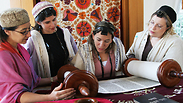
'Women are finally being celebrated in Judaism' (archives)
צילום: חנוך גריזינסקי
Women creating a new tradition
Op-ed: Secular humanistic rabbi writes about changing reality as more women are being ordained as rabbis.
Women are finally being celebrated in Judaism. In the past, women were silenced under the chuppah, girls' birth ceremony was played down, and their bat mitzvah wasn't even marked. In the past, only men conducted ceremonies, but reality has changed.
For several decades now, women have a new profession: Women are ordained as rabbis, conduct life cycle ceremonies and holiday ceremonies, lead communities, operate study classes at youth cultural centers and in community homes they lead. They work on the legal level, are part of Knesset lobbies and advance social activity.
I am like that – I am a rabbi and serve as the dean of Tmura, the International Institute for Secular Humanistic Judaism, which has already trained and ordained dozens of women for this role.
I am a traditional person. My parents gave me knowledge about my familial and cultural roots, and bestowed moral messages. But, of course, not just they. We absorb traditions from the education system, from our experiences in society, and are subject to the authority of the State, which implements traditions through the laws it enforces. Not every tradition is positive, and the fact that a custom originates in "the family home," and was delivered from previous generations, does not necessarily make it positive. Unfortunately, discrimination and exclusion of women were incorporated in the joint tradition.
Once, societies were religious, their leaders pretended to speak on behalf of God – and under that capacity they set rules of behavior and lifestyle. In the Jewish religion, for example, it was determined that there is such a thing as an "impure woman." Why would anyone think that it is a tradition which should be preserved? This is an offensive and absurd decision, which most definitely should not be preserved.
Another famous example is what is said every morning in the men's section in synagogues, "Blessed be He who did not make me a woman" – an unfounded sentence which modern religious people have realized long ago that should be left out. But the perception discriminating and excluding women is incorporated both into the Israeli secular culture spiritually and into the political conduct which intervenes in personal life ceremonies.
Creating an egalitarian and just state
We do it differently. We escort girls and their families in a fascinating study process, in which the girl learns about herself and about her family, as well as chapters from the pivotal Jewish literature, including the Bible. Together with the family, we create a unique ceremony held at the synagogue, in the desert, at an archeological site or in their home.In addition, when a boy or girl are born, we write together with the parents a "brit milim" ("covenant of words," instead of "brit milah" – "covenant of circumcision"), which they present to their family and community in a festive ceremony that includes songs and dancing with the celebrating family.
Alongside the joy, there are also moments of grief, pain and mourning in our life, and it is important for us to know how to mark a woman's life in her death just like we know how to celebrate her life during life. These days I am escorting girls who are saying goodbye to their father, and together we are devising the expected funeral ceremony, so that they can bid farewell to him with dignity, with equal opportunity to stand by the grave and say what they think and feel in accordance with their values and faiths. They believe in justice, in equality and in a woman's freedom to decide how to live her life – and we, as secular humanistic rabbis, should allow that.
I am also a secular and traditional rabbi. I am guided on the issue of what is in place and what isn't, like my Zionist mothers and fathers who asked themselves what should be done for the future of the Jewish people in building a diplomatic option – the establishment of the State of Israel. Now it's my turn to ensure that the State of Israel will be egalitarian and just.
Sivan Maas is a rabbi and the dean of Tmura, the International Institute for Secular Humanistic Judaism










